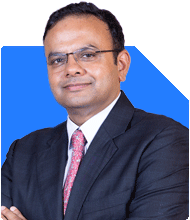Ramalingam Kalirajan |6199 Answers |Ask -Follow
Mutual Funds, Financial Planning Expert - Answered on Jul 19, 2024
He has an MBA in finance from the University of Madras and is a certified financial planner.
He is the director and chief financial planner at Holistic Investment, a Chennai-based firm that offers financial planning and wealth management advice.... more

I am 35 year old ,I need a financial advice of Saving money in mutual fund for short and long term.i has a Term insurance from LIC jeevan anand for 15 lakh ( 21 years paying year ) monthly 38k since 2016 and also now two before started ICICI midsmall 400 ulip monthly 10k ,so please advise for investment at age of 48 need to get a good saving
LIC Jeevan Anand: Rs 15 lakh term insurance, monthly Rs 38,000, since 2016
ICICI MidSmall ULIP: Monthly Rs 10,000, started two years ago
You aim to have good savings by the age of 48.
Evaluating Your Current Investments
LIC Jeevan Anand
This is a traditional insurance plan offering a combination of savings and protection.
Benefits: Provides life cover and savings.
Drawbacks: Lower returns compared to mutual funds.
ICICI MidSmall ULIP
This is a unit-linked insurance plan with mid-small cap exposure.
Benefits: Market-linked returns with insurance cover.
Drawbacks: Higher charges and lower flexibility compared to mutual funds.
Suggested Improvements
Reviewing Current Insurance Policies
While LIC Jeevan Anand offers life cover, the returns are not as high as other investment options.
Surrender or Continue: Evaluate the surrender value and compare it with potential returns from mutual funds.
Considering Mutual Funds
Mutual funds offer higher returns and flexibility. Let's explore options for short and long-term investments.
Short-Term Investment Strategy
Liquid Funds
Liquid funds are ideal for short-term goals (1-3 years). They offer better returns than savings accounts and are easily accessible.
Invest in Liquid Funds: Allocate a portion of your savings for short-term goals.
Short-Term Debt Funds
Short-term debt funds provide stability and reasonable returns for a 3-5 year horizon.
Invest in Short-Term Debt Funds: Allocate funds for medium-term goals.
Long-Term Investment Strategy
Equity Mutual Funds
Equity mutual funds are suitable for long-term goals (5+ years). They offer high returns by investing in stocks.
Large-Cap Funds: Stable returns with lower risk.
Mid-Cap and Small-Cap Funds: Higher returns with moderate risk.
Balanced Funds
Balanced funds invest in both equity and debt, providing a mix of growth and stability.
Invest in Balanced Funds: Suitable for long-term goals with moderate risk appetite.
Systematic Investment Plan (SIP)
Investing through SIPs helps in averaging the cost and compounding returns over time.
Start SIPs: Allocate monthly amounts to various mutual funds based on your risk profile.
Portfolio Allocation
Short-Term Goals
Liquid Funds: Rs 10,000 monthly
Short-Term Debt Funds: Rs 5,000 monthly
Long-Term Goals
Large-Cap Equity Funds: Rs 10,000 monthly
Mid-Cap and Small-Cap Equity Funds: Rs 5,000 monthly
Balanced Funds: Rs 5,000 monthly
Regular Monitoring and Review
Review your portfolio regularly to ensure it aligns with your financial goals and market conditions.
Annual Reviews: Assess performance and adjust as needed.
Consult a Certified Financial Planner: For personalized advice and strategy adjustments.
Final Insights
To achieve your financial goals by the age of 48, consider reallocating your investments towards mutual funds for better returns. Liquid and short-term debt funds are ideal for short-term goals, while equity and balanced funds are suitable for long-term goals. Regularly review your portfolio and consult a Certified Financial Planner for personalized advice.
Best Regards,
K. Ramalingam, MBA, CFP,
Chief Financial Planner,
www.holisticinvestment.in
You may like to see similar questions and answers below
Abhishek Dev |57 Answers |Ask -Follow
Financial Planner - Answered on Aug 05, 2023
Ramalingam Kalirajan |6199 Answers |Ask -Follow
Mutual Funds, Financial Planning Expert - Answered on Apr 26, 2024
Ramalingam Kalirajan |6199 Answers |Ask -Follow
Mutual Funds, Financial Planning Expert - Answered on Apr 24, 2024
Ramalingam Kalirajan |6199 Answers |Ask -Follow
Mutual Funds, Financial Planning Expert - Answered on Jul 12, 2024
Patrick Dsouza |767 Answers |Ask -Follow
CAT, XAT, CMAT, CET Expert - Answered on Sep 02, 2024
Patrick Dsouza |767 Answers |Ask -Follow
CAT, XAT, CMAT, CET Expert - Answered on Sep 02, 2024
Patrick Dsouza |767 Answers |Ask -Follow
CAT, XAT, CMAT, CET Expert - Answered on Sep 02, 2024
Patrick Dsouza |767 Answers |Ask -Follow
CAT, XAT, CMAT, CET Expert - Answered on Sep 02, 2024
Patrick Dsouza |767 Answers |Ask -Follow
CAT, XAT, CMAT, CET Expert - Answered on Sep 02, 2024
Patrick Dsouza |767 Answers |Ask -Follow
CAT, XAT, CMAT, CET Expert - Answered on Sep 02, 2024
Patrick Dsouza |767 Answers |Ask -Follow
CAT, XAT, CMAT, CET Expert - Answered on Sep 02, 2024
Patrick Dsouza |767 Answers |Ask -Follow
CAT, XAT, CMAT, CET Expert - Answered on Sep 02, 2024
Patrick Dsouza |767 Answers |Ask -Follow
CAT, XAT, CMAT, CET Expert - Answered on Sep 02, 2024
Patrick Dsouza |767 Answers |Ask -Follow
CAT, XAT, CMAT, CET Expert - Answered on Sep 02, 2024




















